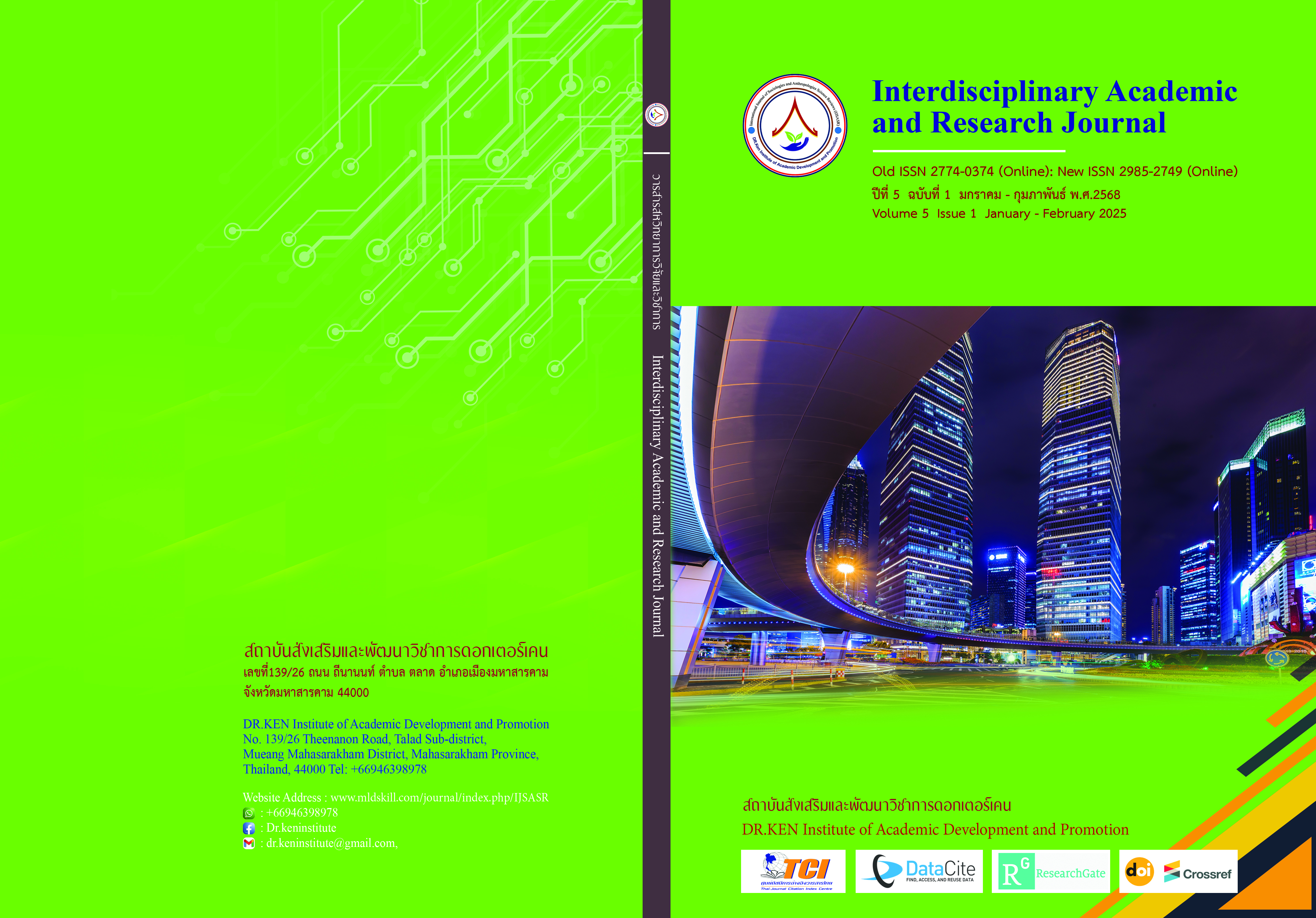English Skill Development and Expectation of English Use in the Workplace: Case Study of Supporting Staff and Project-based Researchers, Institute for Population and Social Research, Mahidol University
DOI:
https://doi.org/10.60027/iarj.2025.280537Keywords:
English skills, Expectations, Using english in the workplaceAbstract
Background and Aims: Supporting staff normally experience a lack of ability to use English in the workplace when communicating with foreign faculties/experts/students. Capacity building that meets these supporting staff’s jobs means that their enhanced capacity can meet the university’s vision. This paper examined knowledge, skills, experiences and expectation of English language use in the workplace in multiple aspects among supporting staff before and after their participation in the English class program. The paper also assessed the satisfaction with the program’s content in each aspect and overall. The program’s intention was that supporting staff would gradually change their behaviors and expectation of English use.
Methodology: The quantitative technique was applied into the study and through the sampled who were supporting staff participating in the program. Totally, 19 people were selected by the purposive sample. The data were analyzed through means and standard deviation.
Results: Major findings presented that the sample group had the moderate level of English use in the workplace in listening, speaking, reading and writing similarly. When looking into each aspect, participants had quite a low level of listening and writing. In speaking and reading, some participants experienced these frequently while some did not. Similar to expectation, some expected to use English in the workplace and some did not. However, participants showed satisfaction towards the class’s content.
Conclusion: Skill development and expectation of English use in the workplace were not achieved as written in the objectives. Two recommendations arose. First, the English class for workplace context should be organized in a continuous manner so that staff could change their behaviors regarding English use. This could bring forth the organization’s achievement. Second, the organizers should evaluate the target group’s level of knowledge, skills, experiences and expectation of English use in the workplace beforehand. This evaluation could help planning, categorizing and designing contents to match the participants’ needs.
References
กัลยา วานิชย์บัญชา. (2561). สถิติสำหรับงานวิจัย. พิมพ์ครั้งที่ 12. กรุงเทพฯ : หจก.สามลดา
กาญจนา แก้วบ้านดอน, ธีราภรณ์ พลายเล็ก. (2564). การพัฒนาความสามารถในการอ่านภาษาอังกฤษเพื่อความเข้าใจโดยใช้เทคนิคการอ่านแบบ SQ3R สำหรับนักเรียนชั้นมัธยมศึกษาปีที่ 1/1 กรณีศึกษาโรงเรียนวัดบวรมงคล. Journal of Modern Learning Development, 6(4), 202-211.
เขมณัฎฐ์ มาศวิวัฒน์, กัลยา นราวัฒนะ และ นิสาชล สันหมาน. (2559). ความต้องการพัฒนาของบุคลากรสายสนับสนุนคณะศิลปศาสตร์ มหาวิทยาลัยสงขลานครินทร์. วารสารวิชาการ ปขมท, 10(1), 151-159. https://www.council-uast.com/journal/upload/fullpaper/23-07-2021-937700443.pdf
จันทร์สุดา บุญตรี. (2561). ศึกษาและพัฒนานวตกรรมการสื่อสารภาษาอังกฤษอย่างมีส่วนร่วมเพื่อเพิ่มศักยภาพของบุคลากรสู่สากล: กรณีศึกษาบุคลากรสายสนับสนุนของมหาวิทยาลัยราชภัฎบุรีรัมย์. วารสารรมยสาร, 16(2), 171-194.
จิราภรณ์ พรหมทอง. (2559). การพัฒนาตนเองให้เป็นบุคคลแห่งการเรียนรู้เพื่อเข้าสู่ศตวรรษที่ 21. วารสารวิชาการมหาวิทยาลัยฟาร์อิสเทอร์น, 10(2), 63-72.
ชนม์ณภัทร เจริญราช. (2563). การพัฒนาบุคลากรสายสนับสนุนวิชาการของมหาวิทยาลัยราชภัฎพระนคร. วารสารวิชาการมหาวิทยาลัยราชภัฎพระนคร, 11(2), 147-163.
บุญชม ศรีสะอาด. (2560). การวิจัยเบื้องต้น. กรุงเทพฯ : สุวีริยาสาส์น.
ปรีดาพร คณทา, และ ดารารัตน์ อินทร์คุ้ม. (2559). ทุนมนุษย์กับการพัฒนาทรัพยากรมนุษย์แนวคิดใหม่. วารสารนวัตกรรมและการจัดการ, 1(1), 62-70.
พระมหาธีรวีร์ ธีรวฑฒนเมธี. (2564). แนวคิดเรื่องทุนมนุษย์: ทรรศนะจากทฤษฎีเศรษฐศาสตร์ร่วมสมัยและพุทธปรัชญา. [วิทยานิพนธ์ปริญญาพุทธศาสตรดุษฎีบัณฑิต, มหาวิทยาลัยมหาจุฬาลงกรณ์ราชวิทยาลัย]. บัณฑิตวิทยาลัย มหาวิทยาลัยมหา จุฬาลงกรณ์ราชวิทยาลัย.https://e-thesis.mcu.ac.th/storage/y9qdWu5bglhviIBDHcDRRsDU4pip5scvuZt0xfNc.pdf
พระศรีสิทธิมุนี. (2564). การพัฒนาการสื่อสารภาษาอังกฤษ. วารสาร มจร อุบลปริทรรศน์. 3(3), 922-934.
พีรพันธุ์ แสงเพชร. (2562). The Guidelines of Self Improvement for Employees to be Professionals and Create Competitive Adventage of Electrical Indiusty in Rayong Province. Journal of Industrial Business Administration, 1(2), 69–81. Retrieved from https://so03.tci-thaijo.org/index.php/iba/article/view/232158
รัตนะ บัวสนธิ์. (2556). การออกแบบการวิจัยเชิงผสมผสาน: เรียนรู้เพื่อการพัฒนาด้านการศึกษา. วารสารวิจัยและประเมินผลอุบลราชธานี, 2(1), 1-8.
วลัยพร กาญจนาทารุณ และ ธีรัช ปัญโญ. (2561). ความสำเร็จของนักเรียนและความคาดหวังของนักเรียนและผู้ปกครองต่อการเรียนภาษาญี่ปุ่นของนักเรียนระดับมัธยมศึกษาตอนปลายเขตอำเภอเมืองเชียงใหม่, วารสารเครือข่ายญี่ปุ่นศึกษา, 8(2), 58-76.
วิไลพร ขำวงษ์, สุดคนึง ฤทธิ์ฤาชัย, กมลรัตน์ เทอร์เนอร์, ศุภาพิชญ์ โฟน โบร์แมนน์, สุรศักดิ์ สุนทร และ สุชีวา วิชัยกุล. (2563). ความต้องการจำเป็นในการพัฒนาความสามารถด้านภาษาอังกฤษของบุคลากรสุขภาพ. วารสารพยาบาลกระทรวง สาธารณสุข, 30(3), 223-234.
ศันสนีย์ บุญนิธิประเสริฐ, สืบสกุล นรินทรางกูร ณ อยุธยา. (2562). ความต้องการจำเป็นของการพัฒนาสมรรถนะด้านการใช้ภาษาอังกฤษในการสื่อสารของพนักงานมหาวิทยาลัยสายสนับสนุนของจุฬาลงกรณ์มหาวิทยาลัย. วารสารอิเลคทรอนิกส์ทางการศึกษา, 14(2), 1-13. https://so01.tci-thaijo.org/index.php/OJED/article/view/199208/155883
ศิริลักษณ์ ถิรบรรจงเจริญ. (2560). ความต้องการในการพัฒนาทักษะด้านการใช้ภาษาอังกฤษแก่บุคลากรระดับหัวหน้างานและผู้บริหารระดับต้นในบริษัทเอกชน จังหวัดชลบุรี. วิทยานิพนธ์ปริญญามหาบัณฑิต มหาวิทยาลัยบูรพา: มหาวิทยาลัยบูรพา.
สถาบันวิจัยประชากรและสังคม. (2565). ความร่วมมือกับองค์กรทั่วโลก. https://ipsr.mahidol.ac.th/about-us.
สำนักงานคณะกรรมการข้าราชการพลเรือน. (2563). ได้มีแนวทางการพัฒนาบุคลากรภารรัฐ พ.ศ. 2563-2565. https://www.ocsc.go.th/civilservice.
Aune, AS., Huglen, M., & Lim, D. (2000). English Education and Communication Studies: Ambiguity in the International Airway. Eric Clearing House: Bloomington.
Clement, A., Murugavel, T. (2018). English for the workplace: The importance of English language skills for effective performance. The English Classroom, 20(1), 1-15.
Talaue, F. G., & Kim, M. K. (2020). Investigating the Advantages of English Medium Instruction (EMI) in the Indonesian Workplace. LEARN Journal: Language Education and Acquisition Research Network, 13(2), 321-334.
Downloads
Published
How to Cite
Issue
Section
License
Copyright (c) 2025 Interdisciplinary Academic and Research Journal

This work is licensed under a Creative Commons Attribution-NonCommercial-NoDerivatives 4.0 International License.
Copyright on any article in the Interdisciplinary Academic and Research Journal is retained by the author(s) under the under the Creative Commons Attribution-NonCommercial-NoDerivatives 4.0 International License. Permission to use text, content, images, etc. of publication. Any user to read, download, copy, distribute, print, search, or link to the full texts of articles, crawl them for indexing, pass them as data to software, or use them for any other lawful purpose. But do not use it for commercial use or with the intent to benefit any business.
















.png)


